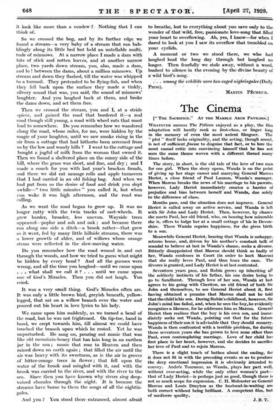The Cinema,
[" THE SACREFICE." AT THE MARBLE ARCH PAVILION.]
WHATEVER success The Pelican enjoyed as a play, the Mm adaptation will hardly rank as first-class,. or linger long in the memory of even the most ardent fthngoer. The "plot " itself lacks originality, and the acting, though sound, is not of sufficient finesse to disguise that fact, or to lure the most casual critic into convincing himself that he has not seen the same theme woven with a different thread many times before.
The story, in short, is the old tale of the love of two men for one girl. When the story opens, Wanda is on the point of giving up her stage career and marrying General Marcus Heriot, a close friend of Paul Lauzun, Wanda's manager. When Marcus breaks the news of his marriage to his parents, however, Lady Heriot immediately creates a harrier of prejudice and bias between herself and Wanda, due solely to the difference of class.
Months pass, and the situation does not improve. - General Heriot is called away on active service, and Wanda is left with Sir John and Lady Heriot. Then, however, by chance she meets Paul, her old friend, who, on hearing how miserable she is, offers to lodge her at a small cottage of his in Devon- shire. There Wanda regains happiness, for she gives birth to a son.
Meanwhile General Heriot, hearing that Wanda is unhappy, returns home, and, driven by his mother's constant talk of scandal to believe at last in Wanda's shame, seeks a divorce. Bitterly disappointed that Marcus should think so badly of her, Wanda confesses in Court (in order to hurt Marcus) that she really loves Paul, and thus loses the case. The divorce is granted, and Lady Heriot is at last contented.
Seventeen years pass, and Robin grows up inheriting all the soldierly instincts of his father, his one desire being to go to Sandhurst. Through love of her son, Wanda at last agrees to his going with Cheriton, an old friend of both Sir John and themselves, to see General Heriot about it, first having obtained a promise that Marcus shall not be told that thechildishis son. During Robin's childhood, however, Sir John's mind has failed, and, when he sees the boy, he evidently recognizes a likeness, for he addresses him as Marcus. General Heriot then realizes that the boy is his own son, and imme- diately seeks out Wanda, pointing out that for the future happiness of their son it is advisable that they should remarry. Wanda is then confronted with a terrible problem, for during those seventeen years she has grown to love none other than Paul, even contemplating marriage. Love of her child has first place in her heart, however, and she decides to sacrifice her love of Paul and to rejoin Marcus.
There is a slight touch of bathos about the ending, for it does not fit in with the preceding events so as to produce the deep emotional impression it is obviously intended to convey. Andree Tourneur, as Wanda, plays her part without over-acting, while the only other woman's part— that of Lady Fleriot—is perhaps just as good, though there is not so much scope for expression. C. H. Mulcaster as General Marcus and Louis Drayton as the husband-in-waiting are both correct without being brilliant. A competent film, but of mediocre quality.
J. B. T.








































 Previous page
Previous page